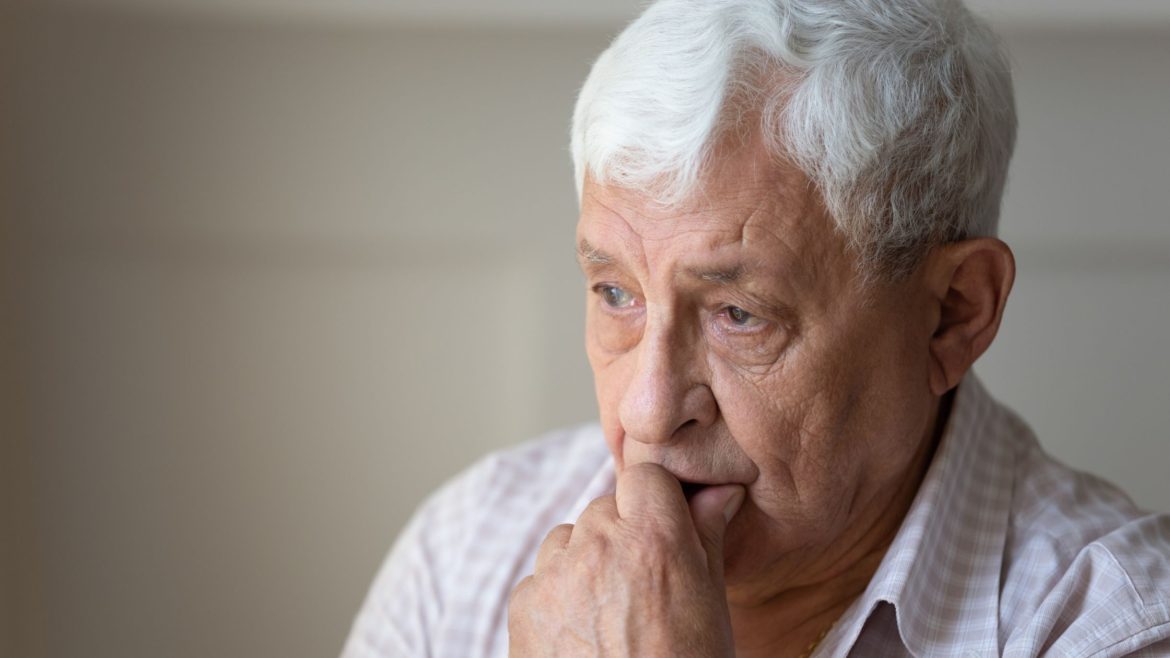
Mental Illness in The Elderly: Symptoms, Causes, Type, and Treatment
Researches show that about 20% of older people in India suffer from mental illness. [source] However, only two out of three of these people receive any treatment.
Mental illness in the elderly is often overlooked and is challenging to diagnose. As a result, its effects can greatly diminish a senior citizen’s health and well-being, complicate the treatment of other chronic diseases, and sometimes even lead to death.
Do you have an older person at home whom you love dearly? Are you also worried about their mental health? Are you a senior citizen? Are you worried about your own mental health? If yes, you must read on to know about the symptoms, causes, types, and treatments of mental illness in the elderly.
Symptoms of Mental Illness in the Elderly
As a person grows old, we see significant changes in them, both physically and mentally. General forgetfulness is quite normal as we grow old, but persistent depression, anxiety, memory loss, or other cognitive issues can be signs of something more serious which should not be overlooked.
You must look out for these signs in the elderly which will tell you that it is not just because they are getting old; it is something much more serious than that.
- Change in sleep pattern: sleeping too much, difficulty in falling asleep, or staying asleep for some time.
- Being emotionally flat: feeling emotionally drained all the time or finding it difficult to concentrate on positive emotions.
- Change in appetite and weight: sudden increase or decrease in appetite which results in a drastic weight change.
- Social withdrawal: not wanting to go out and talk with people, not being able to enjoy the small things in life.
- Management issues: they suddenly face problems managing finance, lose the decision-making capacity, and often stay consumed and disoriented.
- Mood swings: being agitated and increased aggressiveness, a significant change in energy level and mood.
- Health issues: persistent health issues, digestive problems, headache, constipation, etc.
- Suicidal thoughts: the continuous feeling of hopelessness, worthlessness, inappropriate guilt, sadness, always feeling on the edge and restless.
- Memory loss: short-term memory-related problems.
- Substance abuse: a sudden desire for alcohol and drug consumption.
If you have an elderly person under your care, do look out for these symptoms. Keep a close eye on your aging loved ones. And in case they exhibit any of these symptoms, get in touch with the Ufinity life care team, including the primary care physician, to determine the best way to diagnose and treat possible mental health concerns before they become more serious. If you notice any of these symptoms in yourself, reach out.
We offer you a preventive health care platform where our doctors do an exhaustive and comprehensive study about the problems you are facing, your past health issues and create a holistic plan for you. Remember, any change can be significant. Reach out to us.
Causes of mental illness in elderly
Just like young people, older people also experience stress and other emotional health conditions. Due to their age, their condition gets worse. In this pandemic situation, their mental health is getting equally affected as others. Elderly people are more susceptible to mental health disorders at this time. Isolation due to concerns over their increased risk of severe illness from COVID-19 is also taking a toll on seniors’ mental health.
The World Health Organization and the Geriatric Mental Health Foundation provide some other potential triggers for mental illness in the elderly. They include:
- Alcohol or substance abuse
- Alzheimer’s disease
- Loss of a loved one
- Long-term illness like cancer or heart disease
- Chronic pain
- Physical disability or loss of mobility
- Poor diet or malnutrition
- Loneliness
- Widowhood
- Certain medication
Types of mental health disorders in elderly
Below mentioned are some of the most common mental health illnesses that are experienced by older adults:
-
Depression
The most pervasive mental health concern among older adults. It can lead to physical and mental impairments and impede social functioning, it remains untreated. Further, it may also interfere with the symptoms and treatment of other chronic health problems.
Some common symptoms of depression include persistent sadness, problems sleeping, physical pain or discomfort, distancing from activities previously enjoyed, and a general “slow down.” Seniors suffering from depression visit ERs and doctors more frequently, tend to take more medications and experience longer hospital stays than their same-age peers. Women have more chances of getting affected than men.
Treatment: Depression can be treated successfully, even in older adults. But you need to seek help immediately when you see the symptoms. Delay can lead to more complications, and also prolong the time required for cure.
-
Anxiety Disorders
People suffering from depression are very likely to encounter anxiety. Statistics from the CDC show that nearly half of older adults with anxiety also experience depression.
Anxiety in seniors is often left undiagnosed because older adults tend to emphasize physical problems and downplay psychiatric symptoms. Women of this age group are more likely to be diagnosed with an anxiety disorder than men.
There are several different types of anxiety disorders. Here is a list of anxiety disorders you are more likely to witness:
- Generalized Anxiety Disorder: Persistent worry or fear, which can get progressively worse with time, often results in generalized anxiety disorder. Elderly people with generalized anxiety may experience excessive, uncontrollable worry/anxiety, become irritable or agitated, encounter poor quality of sleep or difficulty falling/staying asleep, etc.
- Phobia: An extreme, paralyzing fear of something that usually poses no threat, phobias can cause individuals to avoid certain things or situations due to irrational fears that they have. Like the fear of closed rooms, flying, insects, height, etc.
- Panic disorder: The periods of sudden, intense fear that can be accompanied by heart palpitations or pounding, rapid heartbeat, shaking, sweating, difficulty breathing, or experiencing feelings of doom, results in panic situations.
- Social Anxiety Disorder: People with this social phobia have a fear of being in certain social situations where they feel they might be judged, embarrassed, offensive to others, or rejected.
- Post-Traumatic Stress Disorder: A disorder that usually manifests following a traumatic event that threatens a person’s safety or survival, which greatly impacts his or her quality of life.
Treatment: To address the various anxiety disorders among seniors a variety of techniques, supports, and treatments, including medication, psychotherapy, or a combination of both, are available. Anxiety just likes stress, responds to therapy, if reported within a reasonable time.
-
Bipolar Disorders
Bipolar disorders, or manic-depressive illnesses, are often marked by unusual mood shifts and are frequently misdiagnosed in senior citizens because the symptoms presented are typical with the aging process, especially related to dementia and Alzheimer’s. Bipolar disorder occurs equally among women and men in this age group.
While younger people in the manic phase of bipolar disorder will show classic signs like elation and risky behavior, seniors are likely to become more agitated or irritable. [xi]
It is worth noting that the effects of certain medications and some types of illnesses show similar symptoms. The individual should be seen and diagnosed by a medical professional to determine the root cause of any symptoms as well as the best options for treatment.
-
Eating Disorders
Nowadays more and more elderly are getting affected by eating disorders such as bulimia and anorexia nervosa. Underlying factors include changes in smell and taste, persistent, untreated psychological issues from youth, memory/cognitive impairment, loss of a loved one, etc. As elderly people face many other health challenges like loose dentures, digestive issues, medications, or other health problems that affect appetite and eating, it’s important to judge whether he or she has an eating disorder.
Treatment: The treatment of an eating disorder is typically a combination of psychotherapy, nutrition education and, and also, medications.
Treatments for Mental Illness in the Elderly
Various treatment options are available for those who are suffering from mental health disorders. They include medications, therapies, and sometimes a combination of both. Treating elder people for health conditions like mental illness requires team efforts, as they are unable to care for themselves.
We, at Ufinity Life, understand how essential mental health is for the elderly. Mental health issues amongst older individuals require specialized care: compassion, as well as competence.
The experienced team of mental healthcare professionals is well versed in elder care. We will provide you with an experienced nurse who will help you set up your goals on the Ufinity app to review your daily progress, diet chart, and help you set up regular counseling sessions. We will also monitor your emotional wellbeing, in conjunction with specialists. A panel of experienced doctors will also look after your medication, exercise regimen, etc.
We will ensure that medical care is available to you in the safety and comfort of your home throughout the period of treatment, with round-the-clock support. Your healthcare coach will support you in your journey towards positive health and will ensure that you lead a healthy and happy life.

We are committed to being your partner in health and source for expert medical guidance. See our panel of doctors here. Panel of Doctors